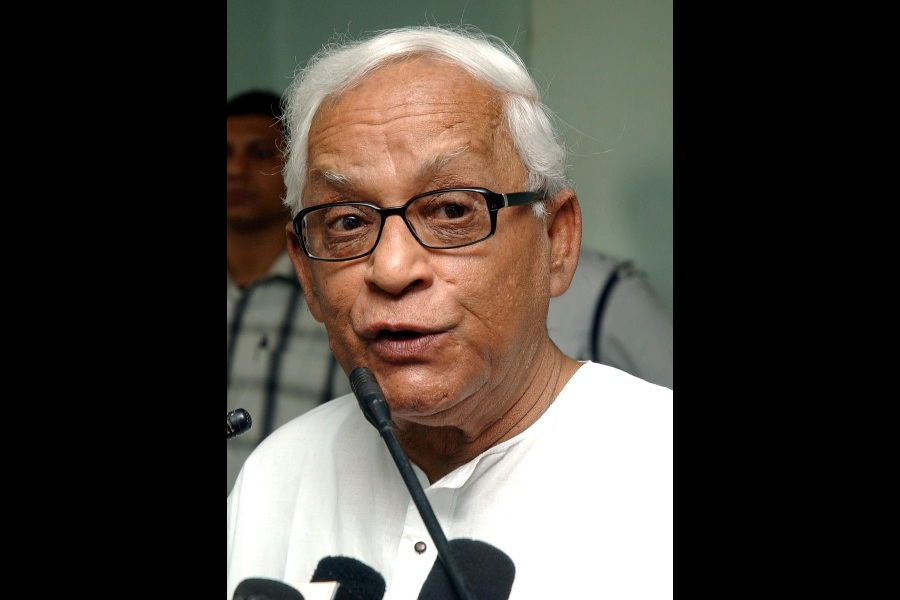Buddhadeb Bhattacharjee had brought in the term “do it now” in Bengal at a time when bureaucratic red tapism was the norm.
The term made headlines those days, but the Coordination Committee — the CPM-backed state government employees’ union — did not like the term as it sent a message that they were not discharging their duties.
As the head of the administration, the then chief minister did not budge under the pressure of the employees’ union and took it upon himself to implement the idea with his actions.
The Telegraph lists two such “do it now” actions of the former chief minister.
Saving officer’s life
The prompt and timely action of Bhattacharjee saved the life of the officer-in-charge of Sankrail police station in West Midnapore, Atindranath Dutta, after he was kidnapped by Maoists led by Kishanji on October 20, 2009.
Dutta was released unhurt by the Maoists the next day. It was widely recognised within the police and the civil administration that Dutta’s release was possible because of the former chief minister’s prompt decision to withdraw forces that had surrounded top Maoist leaders in West Midnapore on October 21, the day after the OC
was kidnapped.
A senior IPS officer, who was involved in the operation, recalled that acting on intelligence inputs, the security forces had surrounded top
Maoist leaders in the forests of Punnapani in West Midnapore the day after the OC
was abducted.
“We had intelligence that Kishanji was hiding in the forests of Punnapani. When we arrived, the Maoists opened fire, and we responded cautiously, awaiting further instructions. We were close to eliminating the
top Maoist leader,” recalled the officer.
But within an hour, the district administration of West Midnapore asked the forces to withdraw allowing the Maoist leaders a safe passage.
“We were surprised as we were very close to pinning down the top Maoist leaders. But later on, we heard that the instructions came from the chief minister himself,” said the IPS officer.
A senior bureaucrat, who was aware of the development at that time, said Kishanji had sent a message through some agencies that they would kill the OC if they were not given a safe passage.
Bhattacharjee was briefed on the situation by the home secretary and the director general of police.
“The former chief minister made it clear that the life of his officer was more important for him compared to the elimination of some ultra-Leftists,” said the bureaucrat.
Push for development
The former chief minister had taken a prompt decision to withdraw an age-old system that some CPM leaders in Purulia had followed which led to a halt in development projects’ execution.
In 2008, when the Bengal government was facing troubles dealing with Maoist problems in Jungle Mahal, the district magistrate of Purulia pointed out that a system —known as the paymaster system — practised in Purulia was creating trouble for the district authorities to undertake development projects in remote areas.
The system first came to the knowledge of the senior government officials during a meeting on the ongoing development projects in Jungle Mahal where the DM, Purulia, raised the issue.
The DM then sent a note to the secretary of the Paschimanchal Unnayan Affairs (PUA) explaining the system and how it was creating problems for them to undertake development projects.
According to the note of the DM, the system was introduced in Purulia in the early days of the Left Front to compensate land losers as the authorities were acquiring land at that time for carrying out development projects in
the district.
“Under the system, the land losers were given funds to carry out small development projects like laying of roads, construction of culverts or installation of drinking water facilities, instead of engaging contractors. The idea was that the land losers would be able to earn a livelihood by carrying out the projects as the government could not give jobs or a handsome amount as compensation for the plots acquired from them. But the system did not work as many of them did not undertake the projects,” recalled a
senior official.
It had become difficult for the district authorities to initiate action against them as many of those paymasters had become CPM leaders or panchayat members.
The PUA secretary then sent the note to the chief minister requesting action.
“Within 48 hours, the former chief minister had called the DM and the PUA secretary and asked them to brief him on the problem. When he was convinced that the paymaster system was creating a real problem, he asked them to issue an order cancelling the system. The chief minister waited in his office till evening to check whether the order was issued,” said another official.











